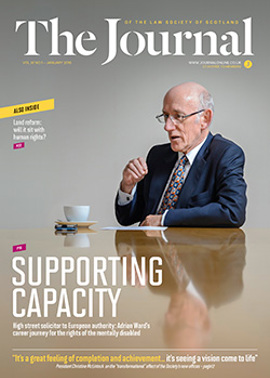Energy input

What was the career path to your current position?
I am from Thurso and studied at Edinburgh University for my first degree, an MA (Politics). I didn’t actually get into the law until my mid-20s. I worked first in the Scotland Office when I did my MSc (Criminal Justice), then as head of policy for the Scottish Police Federation when I did my Strathclyde University LLB, then as special adviser to the Principal of Aberdeen University when I did my DipLP and LLM in commercial law.
I did a joint traineeship with Ledingham Chalmers and Aberdeen University, which was slightly unusual but worked well, and my first legal position was with the Ledingham Chalmers oil and gas team in Aberdeen. As a senior associate I went on secondment to Kerr McGee, to work on the disposal of the company to Maersk Oil, and joined Maersk Oil thereafter. I’ve had a lot of variety in my career.
Can you tell us more about your legal in-house function and how it is structured? How much input do you have in business strategy and governance?
Maersk Oil is an asset-based organisation, with three installations, each producing a number of oil and gas fields. We have around 40 partners in our fields, so we put a lot of work into the various legal agreements that govern how the business of each asset is delivered. I have a team of six lawyers and a paralegal, whose work is structured around each asset. We support the global activity of Maersk Oil through assurance and project work, so the lawyers have a chance to work on projects outside the UK. I’m also company secretary of the 12 UK companies and a trustee of the company pension scheme.
As well as being legal director, I’m director for the communications and HR functions, and sit on the UK management team, which means I have a broad span of influence and help to shape the business strategy alongside my fellow directors.
What is a typical working day for you?
There’s no such thing! One of the reasons I continue to be excited and challenged by the job is that no two days are the same. As part of a very large, global group, being at Maersk also gives me the chance to get involved in international work, so at the moment I am currently involved in several acquisition and disposal projects in the UK and overseas, a renegotiation of a production sharing agreement with a foreign government, a development project in Angola, and closer to home the development of a new gas field. We have also been doing some company restructuring, which has meant a busy year from the employment law side.
What motivates you on a Monday morning?
Monday mornings are about getting the teams together to look ahead at priorities for the coming weeks and further ahead. I will also spend some time with the MD. I know that for many, Monday mornings are dreaded, but I look forward to getting engaged as a team and planning the week.
What do you really enjoy about working in-house?
I enjoyed private practice, but the big difference for me in my current role is being deep in the business and shaping strategy and objectives for the company beyond the pure legal work.
Has your organisation experienced any major change recently?
As most people realise, it’s tough times for all companies in the oil business at the moment. There are determined efforts to improve the efficiency of the business, which have so far been successful. One of the main downsides to that, of course, is that sadly, it has meant losing colleagues from all parts of the business.
What makes a good in-house lawyer? What’s your career advice for young lawyers who want to start an in-house career?
In private practice you’re a lawyer amongst lawyers. When you move into business, you realise how much your professional background makes you a figure that people look to for guidance, often well beyond legal judgments. So my advice would be to see yourself as an all-round adviser, recognise that you will have a head start in being respected by the business – but don’t take it for granted. To work in oil and gas I’d recommend that people work in private practice for a least a few years post-qualifying, especially if the firm has an oil and gas or energy division. I believe the training offered by private practice in the early years gives a good grounding in dealing with clients, preparing balanced legal advice, etc – all skills required in-house also.
What do you look for when you seek external legal advice from solicitors or counsel? How do you see the in-house/external legal relationship changing?
Good judgment, good communication and optionality where that is possible. I look for balanced, pragmatic advice and see a huge benefit in the fact that external lawyers will have seen a particular issue from the perspectives of many different companies.
It is very common for private practice oil and gas lawyers to have also spent some time either on secondment in, or working for, an oil company, therefore they have a really good idea what I am looking for.
What are the current hot legal topics in your sector and how does the future look for in-house lawyers?
We have a new regulator for the industry, with the establishment of the Oil & Gas Authority. It’s a change that the industry has welcomed. The new regulator wants to work more closely with the industry to deliver value from the North Sea, which will mean legal and commercial areas of oil and gas operators will need to understand how to ensure that business, the regulator and government can deliver a win-win for the future development of the UK.
Does Scottish legal education and training provide the necessary skills for working in-house in your organisation?
On a technical level, absolutely, and that’s what the sector should be delivering. The majority of our business in the UK and internationally is conducted under English law, therefore I became dual qualified early in my career and encourage my lawyers to do so also.
How do you think in-house lawyers today are perceived amongst the wider legal profession?
I’m probably not best placed to answer that! I do think the skillsets required for private practice and in-house are very similar, and I also see more movement between private practice and in-house in people’s careers. Therefore I don’t think either is necessarily a path for life.
The In-house Lawyers Group is there to promote the interests of in-house lawyers. How would you like to see this developing?
I think the group is doing a good job. To develop this, I think there’s something around creating awareness that an in-house lawyer delivers benefits for an organisation way beyond compliance and contracts. It’s about judgment, advice and all round acumen. Many in-house lawyers go on to become board members and CEOs of the largest companies – that doesn’t happen if you don’t make a wider contribution.
What is the most unusual work request you have had?
They usually come from friends and family, involving anything from parking tickets, to neighbour disputes to divorce. Unfortunately, unless they own oil and gas assets I am not much use to them for free legal advice!
What keeps you busy outside the office?
I run to try and keep up a level of fitness, and have two dogs that I love to walk in the Aberdeenshire hills. Winter involves as many snowboarding holidays as I can manage, and in September I try to take two to three weeks hiking somewhere like the Rockies.
What one thing would you take with you to a desert island, and what one thing would you put in Room 101?
A supply of No 3 London Gin to the island; internal politics into Room 101.
In this issue
- Cutting the RoS bouncebacks
- Landlords still?
- Split parenting: fewer tears
- Brussels briefing
- Reading for pleasure
- Opinion: Frankie McCarthy
- Book reviews
- Profile
- President's column
- DPA: one year on
- People on the move
- Team building
- Ward's words
- The end of deeds of conditions?
- Human rights and land reform: unanswered questions
- Aye to Brussels
- Appeals: the new landscape
- The 2015 Act: some more thoughts
- Three months in planning
- Buy-to-let: no longer a good bet?
- Scottish Solicitors Discipline Tribunal
- What is ScotLIS?
- Energy input
- Law firms help students' business skills
- Paralegal pointers
- Law reform roundup
- CML Handbook amended
- Service eases stress of separating parents
- Appreciation: Tahir Elçi
- The rocky road to good intentions
- Risk review 2015, risk forecast 2016
- Ask Ash
- What's in store for SYLA in 2016?
- Reflections from the Commission






